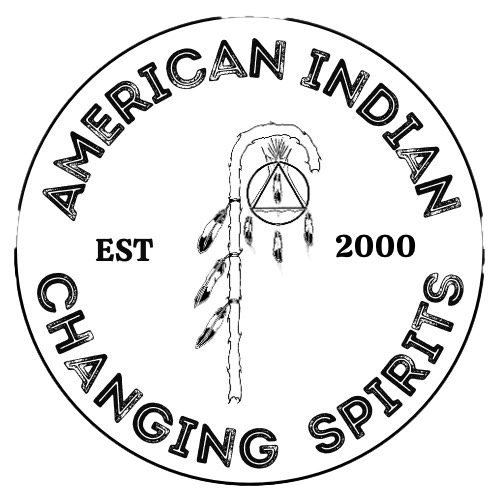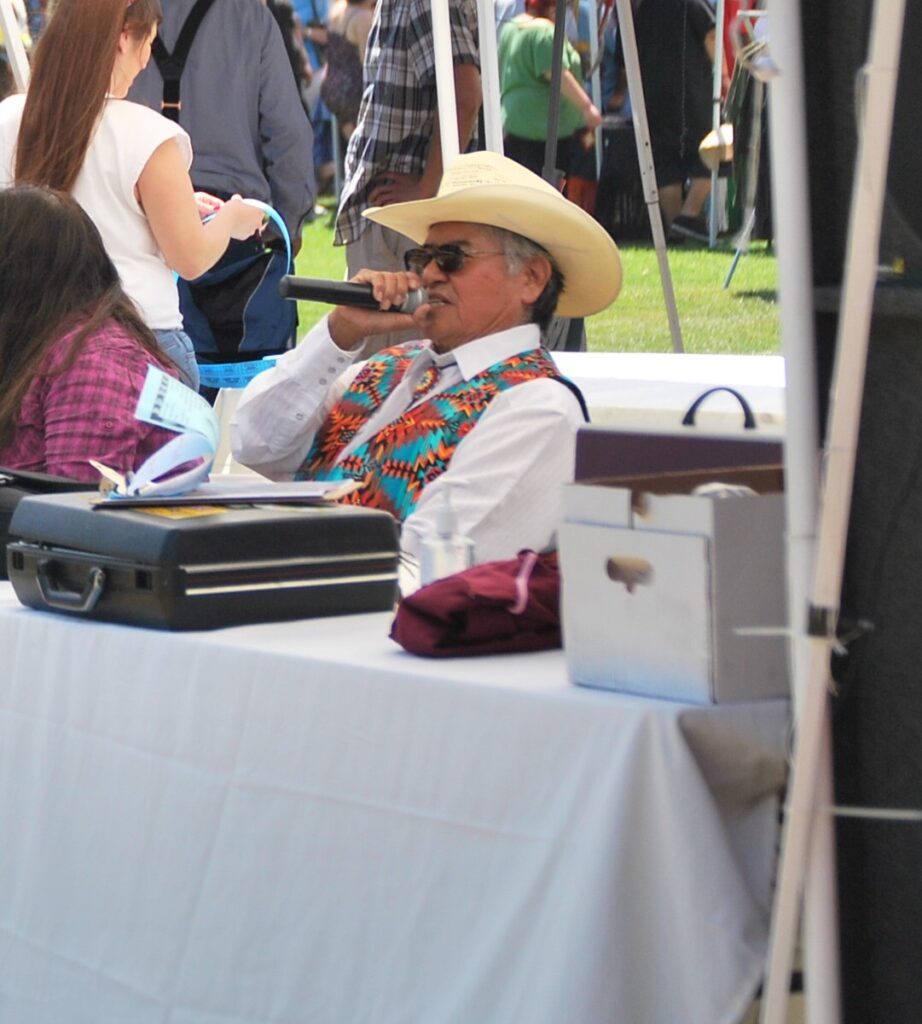Some of the various components and Pow Wow Etiquette
The Arena
The arena is the area in which the pow wow activities take place, It is normally blessed by the Spiritual Leader at the beginning of the pow wow and is considered sacred ground until the end of the pow wow. It is important to treat the arena with respect during the pow wow.
The Spiritual Leader
It is customary to invite the Spiritual Leader from the tribe to which the land belongs. In Los Angeles, this would be the Tongva (also known as the Gabrielino). The Spiritual Leader blesses the arena and helps fill the spiritual needs of the people.
The Master of Ceremonies or MC
The Master of Ceremonies acts as the “host” or voice that presides over the timing of the pow wow. The MC is responsible for keeping the Pow Wow moving in an orderly and timely manner. He notifies the dancers, directs the drums in the order and type of song they will play, and makes announcements of general interest to all present.
The Arena Director
The Arena Director directs activities in the arena and helps ensure appropriate behavior. Sometimes the Arena Director is accompanied by a Whip Man who sees that the arena is treated with respect. The Arena Director is equivalent to a Sergeant-At-Arms maintaining order in the arena, ensuring protocol is followed, and assisting the dancers, the MC, Pow Wow officials, and the Head Staff in carrying out the Pow Wow.
Head Man/Woman Dancer
These dancers are chosen to lead the Pow Wow proceedings based on his or her knowledge of dances, protocol, and traditions. Generally, no one else dances until one or both of the Head Dancers begin the particular dance or set of dances.
The Drum
The Drum consists of a group of singers surrounding the pow wow drum with a lead singer. Most pow wows have a Northern Drum and Southern Drum who perform different songs and styles depending on what is happening in the arena. Other drums are invited to join around the arena. The drum is considered sacred as it is “The Heartbeat of the People,” and it is the central feature to the Pow Wow or any other Native American gathering. At the Pow Wow, each drum comes prepared with a repertoire of as many as 200 songs. The singers must know the appropriate song for the various Pow Wow events and dances. Divided into Southern and Northern styles, the listener will notice singing which differs in tempo, pitch, song configuration, and style.
The Southern Drum
Southern Drum is style of singing and drumming from the Southern Plains, especially Oklahoma. Songs may have breaks or pauses, the cadence is generally slower, and the pitch is lower than Northern Style.
The Northern Drum
Northern Drum is the Northern Plains style of singing and drumming. Songs are generally in four parts with a tailing end, with no breaks or pauses, and uses higher pitch singing.
The Head Singer
Head Singer is the lead singer, most often from the Host Southern Drum. He holds the honorary position, and chooses the appropriate song(s) and leads the drum.
Honor Song
Honor Song: These are specific songs having individual, family, or tribal significance, and are sung on request to accord honor to an individual or occurrence at Pow Wow. It is used to focus attention on the honoree, gain spiritual power while adding prestige to the honoree or occasion. All stand while honor songs are sung.
Gourd Dance
The Gourd Dance is sometimes referred to as a veteran’s dance, and it is principally for men. It originates from the Southern Plains and involves many organized societies. Common regalia include, loose fans, gourd or metal rattles, and a blanket consisting of a piece of red and blue cloth sewn together. The dance consists of subtle movements in place, alternating with movements towards the center of the arena, in a clockwise manner.
Giveaways
Giveaways: This tradition is held when an honor has been given an individual during Pow Wow. It allows the honoree to redistribute wealth in appreciation for the recognition given by honor ceremony. This is a long-standing tradition among most tribes, and is often referred to at Pow Wow as a “special.”
Blanket Dance
Blanket Dance: This refers to a function more than a dance. A blanket is carried around the arena, or placed in the center for a song. Dancers are expected to drop money into the blanket as a contribution to the drum(s), or for some other worthy charitable cause which the MC will announce prior to the dance. Guests of the Pow Wow may also contribute an amount they deem appropriate to the occasion.
Inter-Tribals
Inter-Tribals: This is a general term. These songs welcome all to join the dancers in the arena circle. No experience necessary!!!
Specials
Specials are usually held at the request of individual or families to honor a boy or girl who is “coming out” as a dancer, or to honor someone who has been helpful or performed a meritorious act, or remember a member of the community who has passed on during the past year. Sometimes these include a giveaway in which members of the community are called up to receive gifts from the host of the giveaway as well as an honoring song. A blanket dance may also take place in which a Pendleton Blanket is place on the ground on which gifts are placed (usually money now days – crumpled to keep from blowing away) to honor and individual or group, help with expenses for contributions to the community, or to help in special times of need.
Pow Wow Etiquette
THE ARENA: After the arena is blessed, the circle area is reserved for dancers, drums, and ceremony. Your cooperation in keeping the sacredness of the circle is greatly appreciated. Please also keep your children with you at all times and keep the arena entry (the East Gate) clear.
ARRIVE AT THE START OF THE DAY: The MC will often explain many of the events before they start. If a printed program is available use it to follow the day’s activities. The program may also include special rules of conduct.
A DANCER’S CLOTHING ISCALLED “REGALIA”:
Please do not refer to it as a “costume.” Doing so could be taken as an offense, though the dancer may not voice it. Among traditional dancer it is thought that only clowns and actors wear costumes. A dancer’s regalia is a unique expression of spirit, often comprised of heirlooms and other articles handmade by family and friends handed down generation to generation. Please do not touch a dancer’s regalia without first asking permission.
STAND DURING SPECIAL SONGS: Including the Grand Entry, Flag Song, Veteran’s Song, Memorial Song, as well as any Prayer Songs the MC indicates. Men and women should remove hats during these songs to show respect.
PHOTOGRAPHY REQUIRES SPECIAL ATTENTION: In most cases, panoramic or scenic photography for personal use is permitted. However, always ask permission before taking photos of individuals, and always wait until they are out of the dance arena. Listen for instructions from the MC as to restrictions on photos being taken of the arena activities. Photos are never permitted during Gourd Dance, Prayer/Invocation, and some Honor Songs. The MC will advise.
“You don’t look Indian!”: Keep in mind that Native Americans (with exceptions) are a mixture of ethnic backgrounds, so don’t expect all of the participants to look like what you may have expected a typical Indian to look like. Your consideration will be greatly appreciated.
BRING YOUR OWN SEATING: Unless you are a family member of the dancers, singers, drums, or Head Staff, please provide you own seating. Public seating/stands are often provided. Bring a lawn chair or blanket to sit on. Please do not move chairs or blanket already set to make room for yours.
VISITORS MAY SET UP ANYWHERE BEYOND THE ARENA: If you are early enough to find a spot directly behind the dancers, it is good courtesy to ask their permission, as they often have family and/or friends they wish to have near. Otherwise, we only ask that you do not block someone else’s view, always keep the East Gate entry to the arena clear, and as stated above, never move a blanket or chair already placed.
UNDER NO CIRCUMSTANCES: Are alcohol, drugs, or firearms permitted on the grounds or in the parking lot. If you arrive at the Pow Wow in a state of intoxication you will be asked to leave the grounds.
These rules of etiquette exist to ensure the enjoyment, safety and respect of all in attendance. By your example, others unfamiliar with them will follow.

